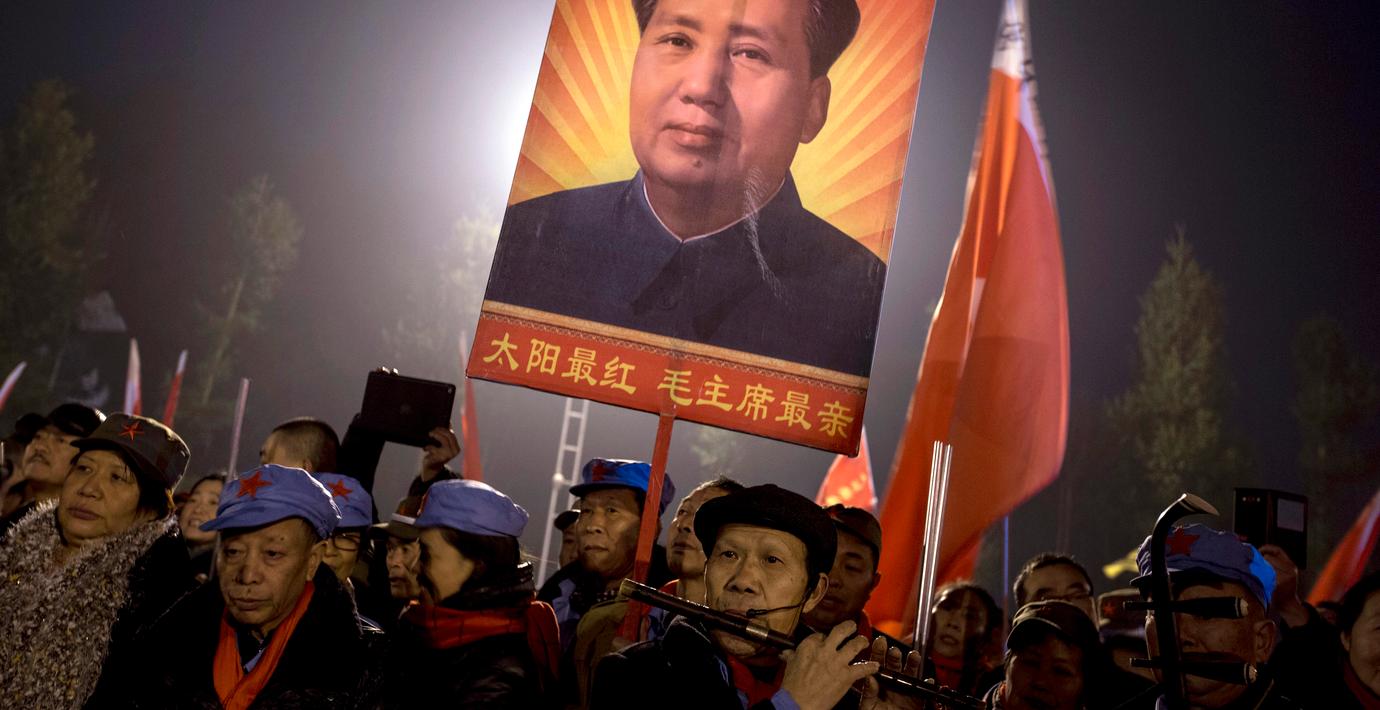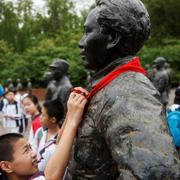
Mao – så tung i Kina fortfarande
50 år efter att Mao Zedong drev igenom den decennielånga kulturrevolutionen har hans ideologi fortfarande många följare i Kina. Miljoner förföljdes, förödmjukades eller dödades under perioden och inte förrän efter Mao Zedongs död förklarades kulturrevolutionen som ”katastrof” av myndigheterna, skriver AP.
Men i den antika staden Luoyang samlas gamla och fattiga dagligen på torget för att minnas och hylla den politiska rörelsen, samtidigt som man tonar ner de våldsamma inslagen. Och i maktens boning i Peking har sånger och danser från kulturrevolutionens dagar fått en renässans, skriver AP.
– Antingen är det för att folk har glömt kulturrevolutionen, eller är allt mer missnöjda med hur samhället ser ut, säger forskaren Xu Youyu.
bakgrund
Mao Zedong
Wikipedia (sv)
Mao Zedong (Mao Zedong , 毛泽东, traditionella tecken 毛澤東, pinyin Máo Zédōng, Wade-Giles Mao2 Tse2-tung1), född 26 december 1893 i byn Shaoshan, Hunan, död 9 september 1976 i Peking, var en marxist-leninistisk teoretiker, politiker och revolutionär. Han var ordförande för det kinesiska kommunistpartiet 1943–1976 och utropade Folkrepubliken Kina vid Himmelska fridens port i Peking den 1 oktober 1949. Han var landets förste president ("ordförande") 1954–1959, men fortsatte såsom ordförande i kommunistpartiet att vara landets diktator fram till sin död.
Maos 27 år vid makten kom att innebära en omskakande inre samhällsomvälvning samtidigt som Sovjetunionen utmanades som kommunismens ideologiska stormakt, med ett nytt maktblock av kommunistregimer omfattande bl.a. Albanien och Kambodja. Även i västländer vann hans lära, maoismen, utrymme under den så kallade vänstervågen, då den utpekades som bärare av en radikalare, mer autentisk kommunism anpassad till de ungas och tredje världens förhållanden. Kritiker, bland andra den kinesiske historikern Jung Chang och folkmordsexperten R J Rummel, utpekar honom som 1900-talets värste diktator och massmördare i dödstal räknat.
De flesta forskare är överens om att mellan 40 och 70 miljoner kineser avled som en konsekvens av Maos styre, varav cirka hälften under det stora språnget som blev ett misslyckat försök att med hast förnya Kinas industri och ekonomi omkring 1959-1962. Ytterligare miljontals dödades under kulturrevolutionen, som lanserades sedan de misslyckade reformerna och uppmaningar till kritik ("låt hundra blommor blomma") bidragit till ökad kritik mot Maos ställning. Kulturrevolutionen fortsatte i viss mån till hans död 1976, varefter en koalition ledd av Hua Guofeng övertog makten och arresterade sina rivaler de fyras gäng. Detta banade vägen för Deng Xiaopings maktövertagande två år senare och reformpolitiken under 1980-talet.
bakgrund
Kulturrevolutionen
Wikipedia (en)
The Cultural Revolution, formally the Great Proletarian Cultural Revolution, was a sociopolitical movement that took place in the People's Republic of China from 1966 until 1976. Set into motion by Mao Zedong, then Chairman of the Communist Party of China, its stated goal was to preserve 'true' Communist ideology in the country by purging remnants of capitalist and traditional elements from Chinese society, and to re-impose Maoist thought as the dominant ideology within the Party. The Revolution marked the return of Mao Zedong to a position of power after the Great Leap Forward. The movement paralyzed China politically and significantly negatively affected the country's economy and society.
The Revolution was launched in May 1966, after Mao alleged that bourgeois elements had infiltrated the government and society at large, aiming to restore capitalism. He insisted that these "revisionists" be removed through violent class struggle. China's youth responded to Mao's appeal by forming Red Guard groups around the country. The movement spread into the military, urban workers, and the Communist Party leadership itself. It resulted in widespread factional struggles in all walks of life. In the top leadership, it led to a mass purge of senior officials, most notably Liu Shaoqi and Deng Xiaoping. During the same period Mao's personality cult grew to immense proportions.
Millions of people were persecuted in the violent struggles that ensued across the country, and suffered a wide range of abuses including public humiliation, arbitrary imprisonment, torture, sustained harassment, and seizure of property. A large segment of the population was forcibly displaced, most notably the transfer of urban youth to rural regions during the Down to the Countryside Movement. Historical relics and artifacts were destroyed. Cultural and religious sites were ransacked.
Mao officially declared the Cultural Revolution to have ended in 1969, but its active phase lasted until the death of the military leader Lin Biao in 1971. After Mao's death and the arrest of the Gang of Four in 1976, reformers led by Deng Xiaoping gradually began to dismantle the Maoist policies associated with the Cultural Revolution. In 1981, the Party declared that the Cultural Revolution was "responsible for the most severe setback and the heaviest losses suffered by the Party, the country, and the people since the founding of the People's Republic".
Tidigare:
Omni är politiskt obundna och oberoende. Vi strävar efter att ge fler perspektiv på nyheterna. Har du frågor eller synpunkter kring vår rapportering? Kontakta redaktionen
